Duplicate records in your customer data are a thorn in the side of employees at every level of your company.
The quality of your customer data impacts almost every team in your organization. Sales teams need accurate customer data for context in sales discussions. Marketing teams rely on quality data to fuel segmentation and personalization within their campaigns. Customer service teams need quality data to provide an excellent customer experience. The C-suite relies on accuracy reporting to make decisions. And duplicate data impacts all of those areas.
Many types of data issues are common in company CRMs. In fact, bad marketing data costs U.S. businesses $611 billion per year. But duplicate data has an outsized impact.
When your database contains duplicate contact and company records, you don’t have a single source of truth. Your employees will always have to check multiple customer records for each action they take. This slows down every task requiring an employee to interface with customer data across the entirety of your organization..
And that’s just scratching the surface on how duplicate data might be pulling your company down.
Let's dig into some of the ways that the negative impacts of duplicate customer data reverberate throughout organizations—and it’s more than you would think.
1. Lack of a Single Customer View
A “single customer view” is what you have when the records in your CRM contain all related data for that contact or company inside of a single record for that entity. It speaks to the reliability of your database as a whole.
Everything there is to know about a contact should be contained within their CRM record, making the entirety of the information easily accessible for your teams and automation campaigns. But duplicate data makes that impossible.
When you have duplicates, your teams will log information in both profiles, splitting your data up between multiple records. One record will have a contact’s city, and the other won’t. Maybe the prospect moved between creating the original record and the duplicate record, leaving one with outdated information.
That lack of a single customer view impacts everyone who uses or updates customer data in your CRM. Your marketing teams rely on personalization, but if they don’t have faith in your database, they will have a hard time using data effectively. And your sales reps will be left frantically checking multiple records for context in sales conversations.
Let’s say that you are a sales rep. When a customer asks you a question, you must view previous conversations to obtain the context necessary to provide a good experience.
But what if a customer has duplicate records? Well, then you will end up checking multiple records. And each duplicate group might not just have one single duplicate, and there could potentially be four or five. That’s a lot of records to check to provide good service to the customer.
So in practice, this usually results in your reps either not checking all of the records and working with a fraction of the context they need or checking all of the records for information and slowing down their process substantially.
Duplicate records in your CRM bog down every employee who interfaces with your customer data.
2. Wasted Budgets
Duplicate records in your CRM eat away at your marketing and sales budgets.
In some cases, the same prospect will receive your marketing communications multiple times. Maybe you deliver multiple emails to the same person, or send them the same direct mail package multiple times. Across a database with high duplication rates, this can measurably drive up costs for every campaign.
Your sales reps will be slowed down because they must check multiple records. Multiply that by all the reps in your organization, and you have a lot of wasted time. A company with lots of duplicate data could spend hundreds of extra hours per month navigating those records.
Additionally, CRM pricing is often tied to the number of records in your database. High duplication rates mean more records, which leads to higher costs.
3. Poor Customer Service
Modern customers expect customer support reps to be aware of their previous interactions with the company. For example, maybe they have talked with your support team multiple times about a specific issue. Having to re-explain that issue over and over again is frustrating and impacts their opinion of your brand—and willingness to continue patronizing your business.
To make matters more complicated, those previous interactions are likely spread out across more than one channel. That’s because most customers use multiple channels. In fact, 50% use more than four channels today, compared to only 7% more than a decade ago.
So to provide an excellent experience, your support reps need to see all of these previous interactions.
When they can do so, they will better anticipate the customer’s problem. Being able to move directly to the next possible solution on the list or escalate tickets if needed saves your customers time and frustration. Anticipating their needs can go a long way toward improving the customer experience.
And customer service has never been more important.
- Almost 90% of customers report trusting a company whose service they rate as “very good.”
- Almost three out of five consumers report that good customer service is key to feeling loyalty toward a brand.
- And 93% of customers are likely to make repeat purchases from brands who offer excellent customer service.
But standing out from the competition doesn’t only require arming your support reps with high-quality data. You also need quality processes in place to ensure that data is used.
4. Negative Customer Experiences
When a customer database contains a lot of duplicate data, the customer experience is guaranteed to be sub-par. Customers are more likely to receive the same message multiple times. Segmentation is also more difficult, leading to less personalized campaigns.
When you have duplicate data, your sales reps will ask prospects the same question multiple times. A prospect’s interactions with your company will feel scripted, automatic, and out of touch with their needs. When your reps lack context and information, they will simply "go through the motions" and provide a generalized sales experience to your customers.
And if that prospect becomes a customer despite all these issues, duplicate customer records will impact the level of support that they receive. Reps will be slower to react and won’t have the context they need to deliver a stellar experience when that customer comes to them with questions.
Duplicate data rears its ugly head throughout the customer lifecycle, making every interaction a little worse than it needs to be.
5. Less Effective Segmentation
Personalization is the backbone of modern digital marketing. The more data your company can collect and reliably use, the more specific your marketing teams can be in their marketing messaging.
If you can’t trust your data, you might not be able to perform deep segmentation. For instance, attempting to target “CEOs of roofing companies in Calgary, Canada, with at least an estimated $5 million+ in revenue” would be difficult if you couldn't rely on your data. Instead, you might have to launch a campaign for “roofers in Canada.” Your messaging will be less personalized, killing your conversion rates.
Your ability to segment your customers is a significant factor in the amount of revenue you can pull from your customer database.
6. Missed Opportunities
When you split your customer context between multiple records, it’s impossible to capitalize on the opportunities in front of you. You may miss delivering that critical piece of content at the perfect moment because you sent it to a contact’s personal email address instead of their business email.
More broadly, duplicate data will cause missed opportunities simply because a business doesn’t understand exactly where it stands due to skewed data.
For instance, let’s say that you wanted to understand more about the CEOs that you have in your CRM and improve how you communicate with them. You might start by creating a report about how many CEOs you have in your database. Then, you might want to filter and segment those records in different ways. Where are they located? What industries do they work in? What kinds of messages do they respond to?
But if you have duplicates, all of those reports would be inaccurate. And the level of inaccuracy is dependent upon the size of your duplicate data problem. The more duplicates, the more inaccurate your reports will be and the more affected your decision-making process is. At that level, duplicate data can mean failing to identify and capitalize on opportunities across your organization.
7. Sales Team Inefficiencies
Duplicate data is downright annoying for your sales reps.
They, above all other job titles, need a single source of truth to speak effectively to prospects. Having that context split up between multiple records means they must search for duplicates for every prospect they engage with. This slows them down and makes them more likely to miss critical information.
Because sales rep earnings are often tied to commissions, this is a problem.
If you have duplicate data issues, they’ll contact fewer prospects per day and spend more time digging through the CRM for context. They’ll be less effective in the conversations that they do have. And, ultimately, they’ll earn less money. You may have two different sales reps reaching out to the same prospects, sending mixed messages and tanking both of their chances of closing a deal.
Additionally, automated lead routing systems may send the same prospect into the pipeline multiple times, creating confusing situations for the sales reps, customers, and a bad experience for everyone involved.
This is incredibly frustrating and makes it very difficult to retain good sales reps. The best salespeople will go where they love their work and can maximize their earnings. That will never be a company that doesn’t have its customer data in working order.
8. Inaccurate Reporting and Less-Informed Decisions
Imagine this: There is a contact in your database with an obscure job title. Maybe it is a magic supply company and the owner’s title is “chief magician.” He is, hopefully, the only person in your database with this title.
Now let’s say that, due to an import error, you accidentally imported his contact record more than 50 times, and your CRM system missed it because the record had no email.
Now you have 50+ chief magicians in your customer database. If you were to run a report about job titles in your database, chief magicians would be overrepresented.
This is a ridiculous example, of course. But it does paint a picture. Imagine that same issue for more popular job titles like chief marketing officer or vice president of operations. How many of them are being overrepresented in your data due to an unmitigated duplicate data problem?
And what if you make decisions based on that data? Without understanding how many duplicate records you have in your database, your “data-backed decision-making” might not be as precise as you thought. And discerning which fields and reports are generating problematic data is almost impossible without bulk deduplication.
9. Harmed Brand Reputation
For many of the reasons mentioned in this article, duplicate data hurts the reputation of your brand. And that is something that you don’t want to mess with.
Poor brand reputation doesn’t only impact customers, either. Negative reputation costs companies at least 10% more per hire—because that’s the increase in salary necessary to attract talent to a business with a poor reputation, according to Harvard Business Review.
Duplicate data will cause your marketing team to make mistakes like calling people the wrong name, contacting them multiple times with the same offers, and generally under-personalizing all of their marketing messages due to duplicate data.
Sales teams are slow and ineffective when they have to worry about working around a duplicate problem. Support teams can’t provide a good experience to customers. The C-suite might make errant decisions based on skewed reporting and forecasting.
All of this ends up impacting the experience of your prospects and customers and ultimately leading to less positive feelings about their experience with your brand.
How Insycle Solves Your Duplicate Customer Data Problems
Insycle is a complete solution for CRM duplicate detection and merging with advanced controls to ensure that you can identify and merge more duplicates.
Duplicate Tracking
Insycle’s Customer Data Health Assessment includes the Duplicate Data category, which tracks duplicates across your entire CRM database, identifying duplicates using various matching templates.
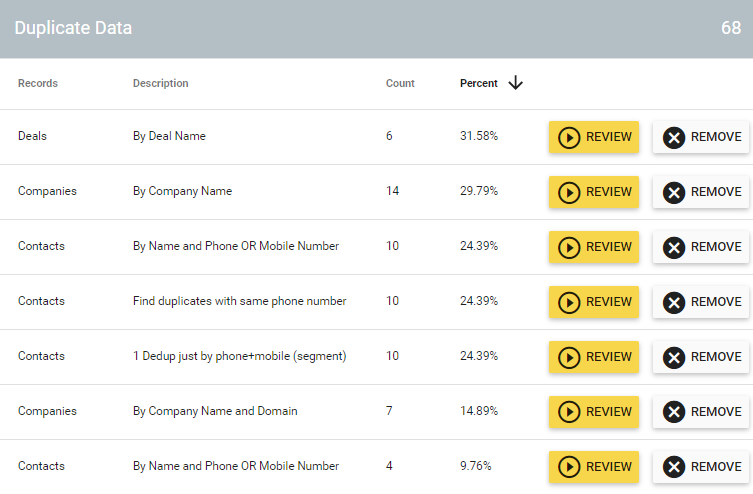
This gives companies a simple but effective way to monitor duplicate data levels in their system and easily merge them.
Identifying and Merging Duplicates in Your CRM
Insycle’s Merge Duplicates module is an incredibly powerful tool for identifying and merging duplicates in your system in advanced ways.
You can match duplicate records in your system using any field as a matching field. Then, you can use Similar Match to catch more duplicates. In addition to this, you can instruct Insycle to ignore things like symbols, common terms (like LLC), white space, or other aspects of any field that you choose. That way, Insycle can identify the maximum number of duplicates no matter how clean and unstandardized the underlying data is.
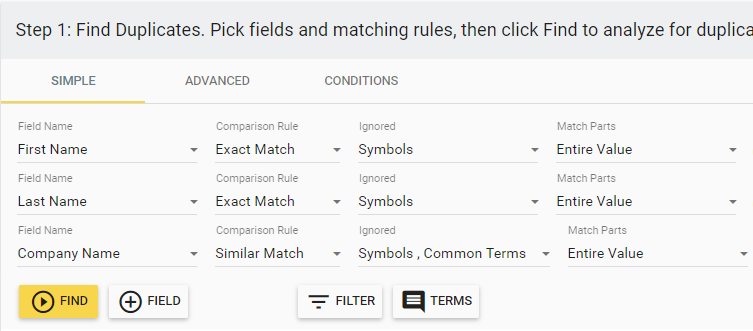
You can even match your chosen fields to similar fields, such as comparing the listed phone number to the mobile phone number. This allows you to catch duplicates that otherwise would have flown under the radar.
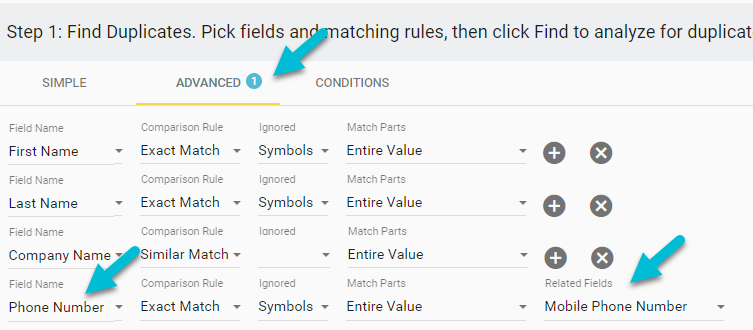
And you can select specific conditions for each field. For example, you could specify that a field must contain a value in all records in a duplicate group for the group to be merged. Or, you can allow for some matching fields to be empty. This is great for catching more duplicates using those fields, while still giving Insycle more flexibility in how it identifies those duplicates.
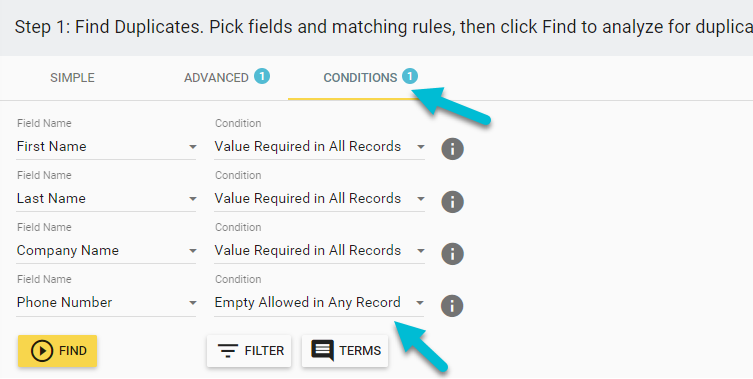
Flexible, Powerful Master Record and Data Retention Options
With Insycle, you also have complete control over the resulting master record. You can set rules for determining what the master record will be, which will be executed in order. For example, in the screenshot below, the record with the highest number of marketing emails clicked will be chosen as the master record.
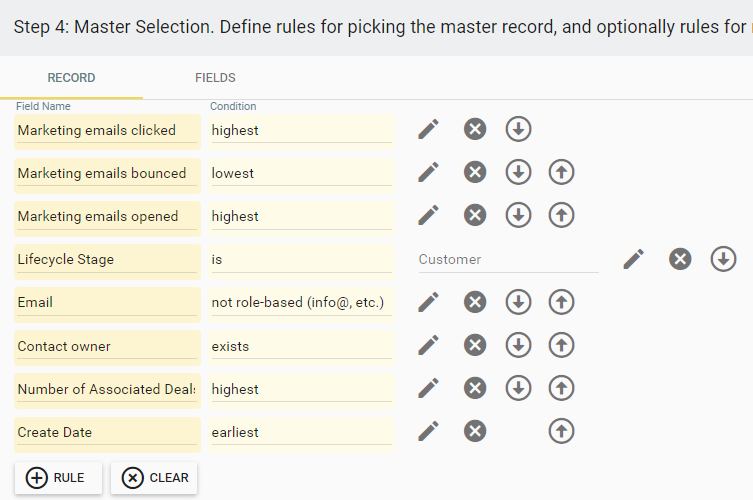
But choosing the resulting master record isn’t the only control you have over how data is retained during the merge. You can actually specify rules for how data is retained during the merge for every field in your CRM database for the record type that you are merging. You can even use other fields as an indicator. In the first rule below, we are keeping the email from the record that has the most recent deal close date.
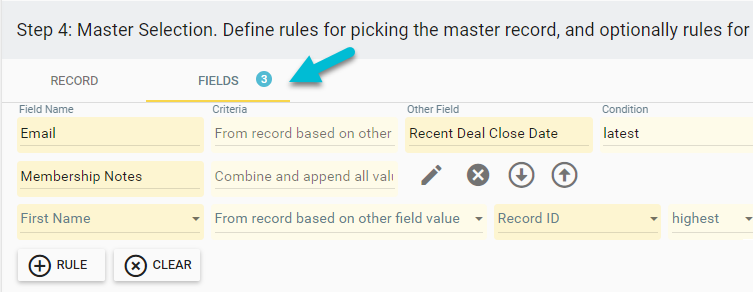
Automating Customer Data Deduplication
With your template reliably identifying and merging duplicates, you can then automate the template to run on a set schedule to ensure that your duplicate records are consistently identified and merged.
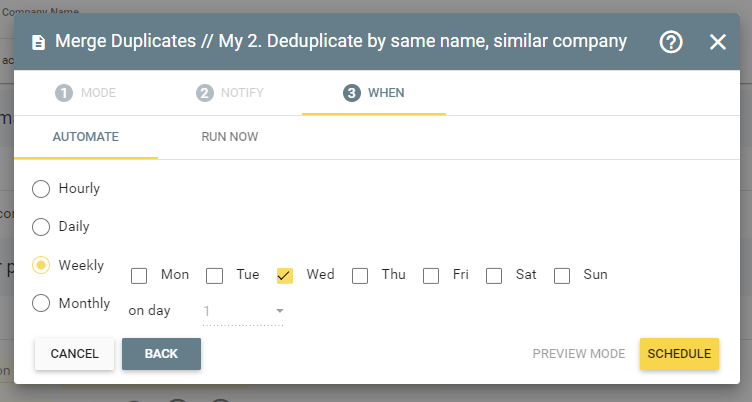
Further, you can bundle multiple templates into a recipe and automate them together. That way, duplicate records are being identified in merged in multiple ways, maximizing the number of duplicates that you are able to merge in your database.
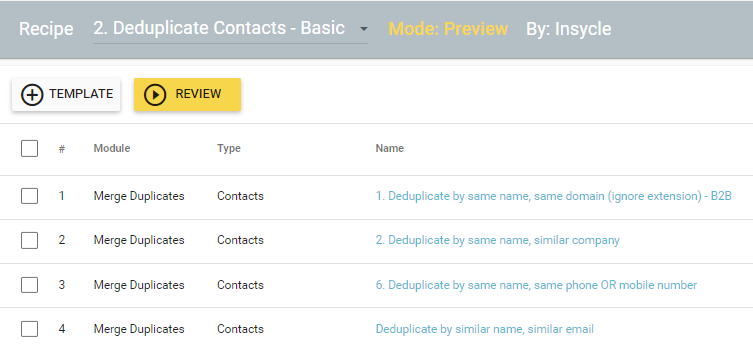
Imagine having all of your duplicate records identified and merged on an ongoing basis, almost completely eliminating all duplicates from your database.
Duplicate Data Is a Bigger Issue Than Most Know
Duplicate contact and company records gum up the machinery that drives businesses forward. What may initially seem like a small problem on the surface is actually an issue that should be a top priority to fix.
Yet, many companies are blissfully unaware of how bad their duplicate data issues are. The only time they even think about it is when an employee complains. And even then, in many companies the response is generally a vague, “Yeah, we should do something about that,” without any follow-up.
If more companies had a true understanding of the impact of duplicate records, they wouldn’t be so quick to overlook them.
But insycle delivers a more comprehensive solution than just identifying and merging duplicates. It's a complete CRM data management platform, helping companies to see through data quality blind spots, improve operations, and position themselves for growth.
Want to learn more about how Insycle can help you improve your data management operations? Learn more about how Insycle can help and make data quality a priority moving forward.






